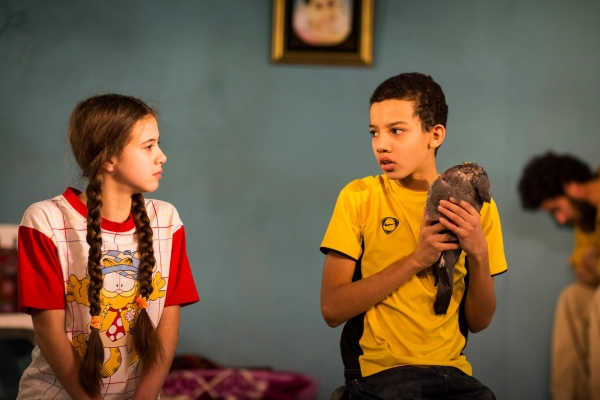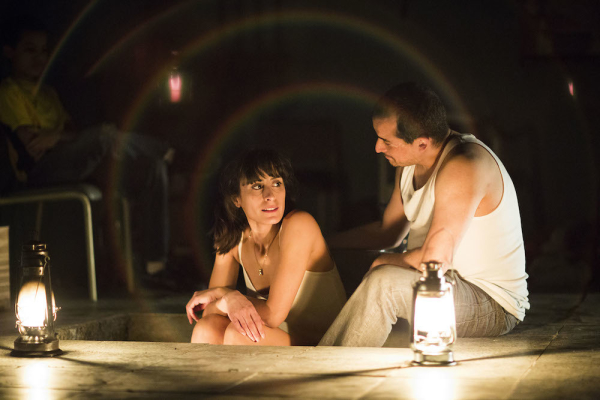Fireworks (Royal Court) – unnerving snapshots of Palestine
Dalia Taha’s specially commissioned Palestinian drama centres on two children caught up in conflict

© Helen Maybanks
Two children are playing soldiers. One mimes an imaginary gun. It's approximate: the proportions are wrong and he's not feeling its weight. The other, her face covered in face paints, holds her hands behind her head and stares straight ahead. They call this The Checkpoint Game. "It's boring," she says.
This would be innocuous – just two more children mimicking war – but for the fact that they're playing in Palestine. Their play, though guessed at and gawky, is too real by half; too close to reality for comfort. It's not simply playground soldiering. He's cruel. Power-tripping. Psychological. "Git back, git back. Yalla. Yalla," he shouts. He blows imaginary cigarette smoke in her face. When he shoots – "BANG BANG BANG" – she falls to the floor, playing dead, but bleeding nonetheless.
Dalia Taha's play is full of scenes like this, snapshots really, where reality bleeds into make-believe and vice versa. It's not just the kids, either. Parents play too: two grown women skip like schoolgirls; a father plays at fixing electrical items, just for something to do. In trying to protect their kids, to preserve some semblance of innocence, they turn siege life into games and watch rockets like fireworks. But the adults are seeking their own comfort as well: praying "magic tape" and key ring Quarans will keep them safe, for instance.
Snappily translated by Clem Naylor, Fireworks shows two neighbouring families co-existing side-by-side, a potent metaphor given the context. There's no plot per se, only snatches of their lives: not socio-realistic, but poetic and dreamy. Violence gets into everything: pistols sit on bedside tables, children make model graves at home. Richard Twyman's unnerving production finds the rhythm of a fireworks display, lit up by Natasha Chivers's jumble of bulbs, candles and torches and punctuated by black-outs. It's a visceral watch: relentless yet delicate, beautiful but grim. The combination is dizzying and destabilising.

© Helen Maybanks
What Taha does brilliantly is convey the precarity of life in Palestine, then trace its over-arching psychological and philosophical impact.
Out of these blurs, language shifts. Mothers make their dead children into martyrs, making their deaths meaningful and allowing them to live on somehow, elsewhere. Yet as words warp, so does the world. Death becomes something else; something to be played, not feared. How else does one cope with the idea that your children might not make it home from school?
With death always possible, adulthood and childhood become indistinct. In one searing scene, a young girl has her first period and, unprepared, applies TCP, as one does a cut. As she writhes in agony, her mother stands over her, offering neither comfort nor explanation; not even marking the moment.
This is a deeply troubling play; difficult and elusive, especially at this speed, but all the more disconcerting for that slipperiness. It's played beautifully, with both detachment and delicacy, by an ensemble that includes Saleh Bakri and Shereen Martin, with the young actors (Yusuf Hofri and Shakire Riddell-Morales on press night) outstanding. I left shaken and wrung out, but Lizzie Clachan's set, strewn with connecting cables and bursting out of its frame, makes it clear that's not enough.
Fireworks (Al'ab Nariya) runs at the Royal Court until 14 March












